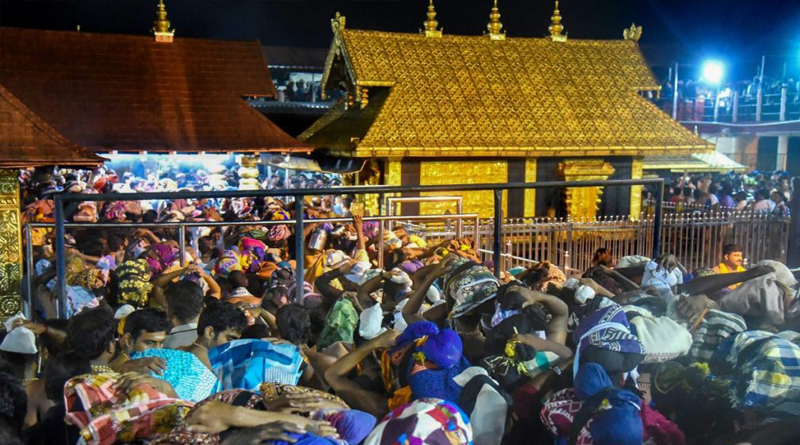The Supreme Court order on admitting women to the Sabarimala Temple is being flouted by Hindu mobs. The Congress has joined with the BJP in backing the mob.
If the Constitution and Supreme Court matter so little, is mob rule going to become the new political norm?
The Congress decries the lynch mobs that have killed Muslims accused of eating or trading in beef. Yet it backs the mob at Sabarimala. So, its opposition to beef lynching looks like a cynical political ploy rather than a matter of principle. If the party believes that Hindu religious feelings cannot trump the rule of law regarding beef, why not Sabarimala too?
The BJP accuses the Congress of pseudo-secularism on the ground of its Muslim appeasement, notably in the Shah Bano case. At Sabarimala, the Congress is guilty of Hindu appeasement. Either way, the once-proud secular party of Jawaharlal Nehru is now firmly pseudo-secular.
The notion that menstruating women are impure and polluting has no basis in the “scientific temper” that Nehru extolled as a philosophical goal. This is not just a Hindu problem. It is a problem in many faiths, including Islam and the Orthodox Christian Church.
Most mosques prohibit menstruating women from praying, and some prohibit even their entry. The famous Haji Ali shrine in Mumbai decided in 2011 to ban Muslim women from entering the sanctum sanctorum of the dargah to lay flowers or chadors (sacred sheets) on the Sufi saint’s grave. The Bharatiya Muslim Mahila Andolan, a courageous group of Muslim women activists led by Noorjehan Sadia Niaz and Zakia Soman, petitioned the courts saying their fundamental rights were being violated.
The dargah trust gave the Bombay High Court a variety of specious reasons for imposing these restrictions on women. It said that the “free mixing” of men and women was discouraged in Islam, that menstruating women were unclean, and that it was a sin to allow women close to a male saint’s grave. It even alleged that women might “show their breasts” while bending over the grave, and that they wished to protect women from sexual harassment.
None of this explained why women had been allowed to enter the inner sanctum of the dargah from 1430 to 2011, albeit through a separate entrance. If for centuries women were not viewed as unclean trespassers on a sacred spot, how did this become an issue in 2011? If till then millions of Muslim women had visited the shrine without “showing their breasts” when bending down, and hence attracting male molesters, what caused the new concerns of the dargah trust in 2011? Was it a change in female dress fashions? Had seethrough dupattas and kameezes become all the rage? Or had Muslim men suddenly become sexcrazy and uncontrollable in the dargah?
No, the objections of the trust were farcical. The Bombay High Court quite rightly dismissed the objections of the dargah trust and said the inner sanctum should be open to women. The trust appealed to the Supreme Court, but got no relief.
Did the dargah or Muslim males in Mumbai form mobs to flout court orders, and keep women out, as at Sabarimala? No, despite much Muslim dismay and wailing about court intrusions into religious matters, the dargah implemented the court instruction on equal treatment of men and women. It created a separate entry path for women but allowed men and women equally into the sanctum. It built a railing keeping both male and female worshippers some distance from the grave itself. Marvel of marvels, Muslim women did not show their breasts, and Muslim men did not leap on them. Peace and harmony returned to the dargah.
In Swaminomics last week, I pointed out that the BJP had hailed the Supreme Court ban on instant triple talaq as a great victory for women’s rights. Why then did it oppose women’s rights at Sabarimala? Did only Muslim women have rights, not Hindu women?
Some angry Hindus responded that there could be no comparison. They said the issues in triple talaq and Sabarimala were so totally different that it was ridiculous to compare them.
Very good. This column now makes a comparison that is surely valid. In both the Haji Ali and Sabarimala cases, the issue was whether religious traditions on the pollution of holy places by supposedly impure menstruating women could negate their constitutional fundamental rights. In both cases the Supreme Court said no. Its stance was logical and consistent. That cannot be said of either the BJP or Congress.


